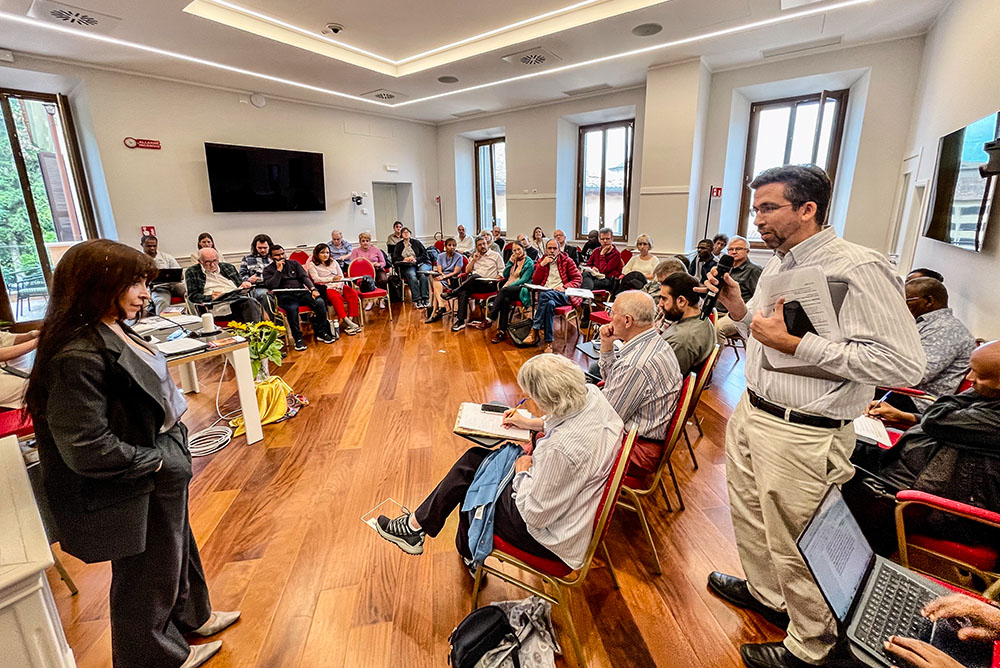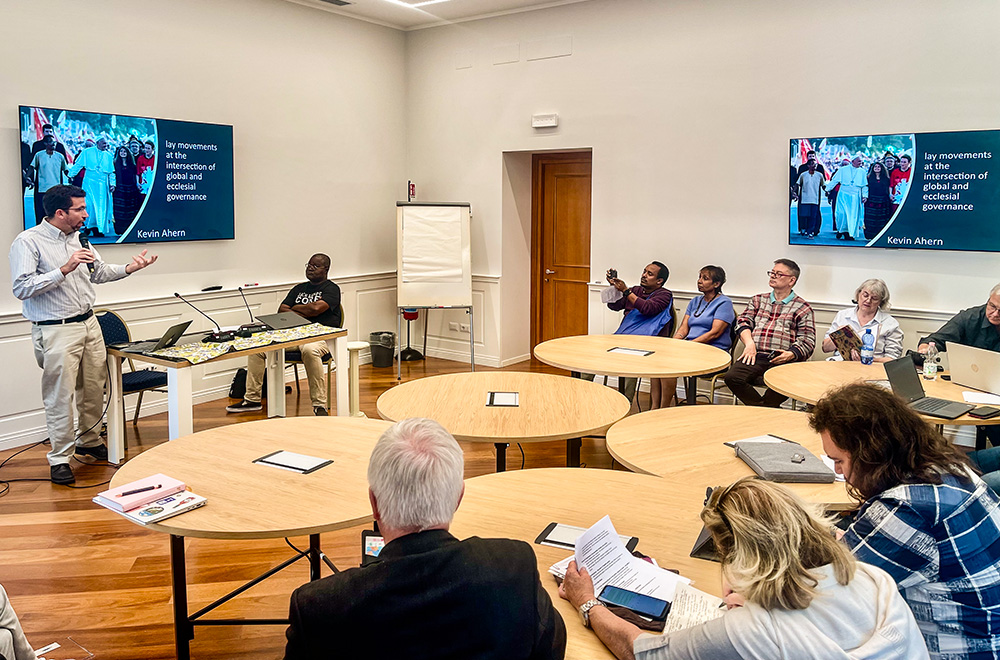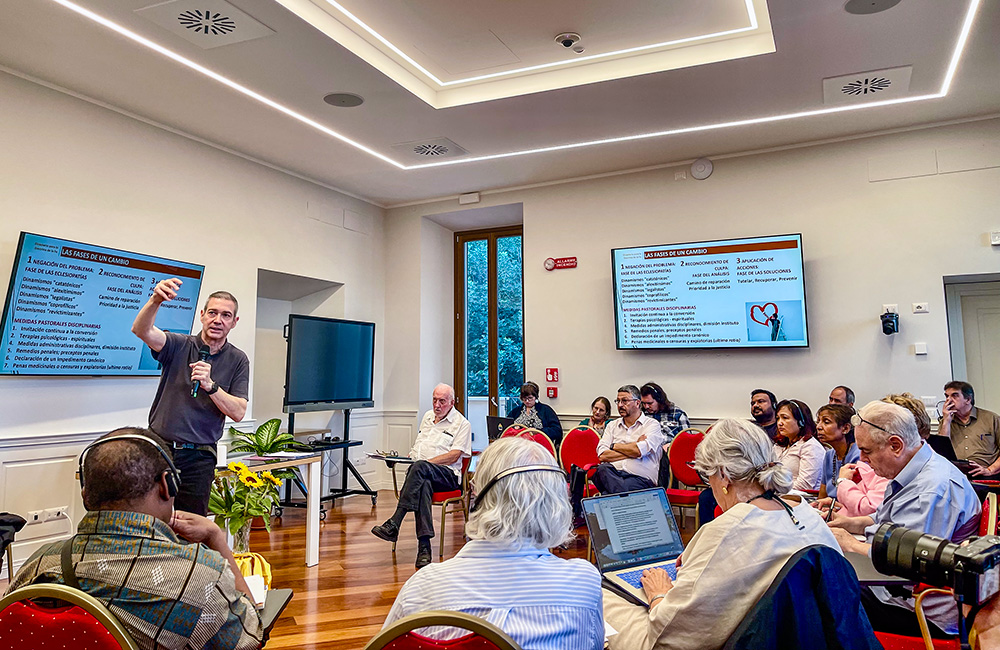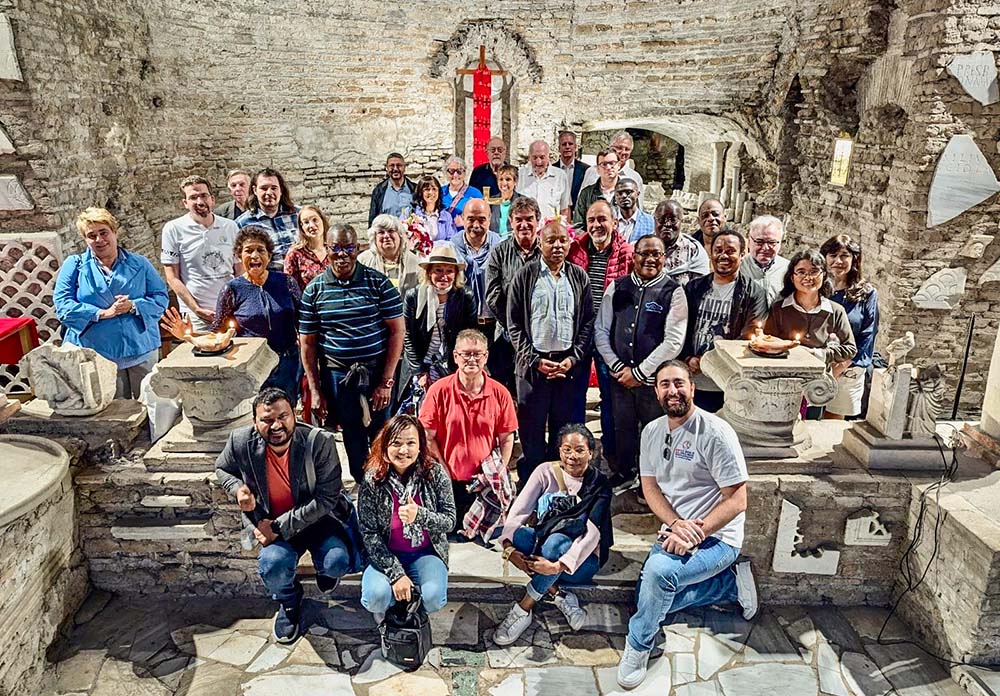
Emilce Cuda, secretary at the Pontifical Commission for Latin America, and Kevin Ahern, Manhattan University theology professor, speak at a session of the Lay Mission and Vocation Conference in Rome on Oct. 11. (NCR photo/Camillo Barone)
Just 2 miles from the Vatican, in an ancient Roman monastery, lay leaders from Catholic associations and organizations around the world met during the second week of the synod on synodality. They discussed challenges and strategies, but most importantly, they relayed their hopes for the church to synod delegates.
The Australian Cardijn Institute and the French-based Centre International Cardijn, in partnership with multiple lay apostolate movements, organized the Lay Mission and Vocation Conference in Rome Oct. 9-13.
At the end of the week, the group of about 30 representatives of Catholic lay student and professional organizations issued an official statement with the headline "Protagonists of Synodality" that they sent to all the delegates they knew personally and to the synod secretariat.
The statement was a blend of gratitude, criticism and hope, seeking to shape the future direction of the church. It also called for an inclusive and renewed church, reaffirming the group's commitment to the 1965 "Pact of the Catacombs," a document signed by bishops vowing to live in poverty and renounce worldly possessions.
Expressing appreciation for Pope Francis and the synodal process, the lay leaders acknowledged the pope's efforts to promote a more inclusive church and the value of synodality as a new form of church governance that emphasizes lay collaboration and participation.
In its discussions, the group did not shy away from pointing out the painful challenges facing the church, particularly the harmful effects of clericalism and abuse of power, which they said hinders the lay apostolate's mission. The members also emphasized the need for self-reflection, recognizing that lay movements must confront their limitations and weaknesses.
"The Second Vatican Council envisions laypeople as being living in the world. It has to be all baptized to have a responsibility. One of the fundamental insights that these movements offer, that we gather here today, is that all the baptized — and there's a movement here of children, even children — have an obligation to be protagonists, to be the evangelization, the decree on the apostle of the laity the council talks about," said Kevin Ahern, professor of theology at Manhattan University in New York. Ahern was president of the International Movement of Catholic Students from 2003 to 2007 and president of the International Catholic Movement for Intellectual and Cultural Affairs from 2016 to 2021.

Kevin Ahern talks about the role of laity in the Catholic Church after the Second Vatican Council, during the Lay Mission and Vocation Conference in Rome Oct. 10. (NCR photo/Camillo Barone)
Ahern also pointed to a shift in Catholic ministry, which he described as a trend toward "outsourcing," where external groups manage youth and other ministries rather than allowing laypeople, especially young people, to take the lead.
This shift, he told NCR, undermines the authentic experience and formation that comes from lay-led initiatives and puts the vocations of lay baptized Catholics at risk of being lost in contemporary ecclesial practice, which often prioritizes well-funded, professionally managed ministries over grassroots lay involvement.
Emilce Cuda, secretary at the Pontifical Commission for Latin America, and a keynote speaker at the conference, analyzed Francis' current vision for the laity in the church. In an interview with NCR, she emphasized that the church is not confined to its physical buildings or traditional settings like parishes and Catholic institutions. Instead, it extends to secular spaces such as public universities, government offices and international organizations where baptized Catholics live and work.
She believes these less conventional settings should be recognized as vital parts of the church, in line with Francis' vision of what he has often called an "iglesia en salida," namely a church that goes outward to engage with society's existential and institutional peripheries.
"The model of the actual structure of the church comes from the Council of Trent. Now we are starting a new age, and maybe we must change our seminaries, our curricula at the universities, our way to do the mission, for example through the new virtual media," she said.
Another speaker who generated enthusiasm was Msgr. Jordi Bertomeu Farnós, an official from the Vatican's Dicastery for the Doctrine of the Faith, who works as the pope's special envoy to conduct investigations into clergy sexual abuse in the Catholic Church worldwide. Farnós shared with attendees what he has learned about the abuse of power in the church and the danger of clericalism, calling for a "reset" in the way sex abuse scandals have been handled in the past in dioceses around the world.

Msgr. Jordi Bertomeu Farnós, an official from the Vatican's Dicastery for the Doctrine of the Faith, gives a keynote address about clericalism and sexual abuse in the Catholic Church during the Lay Mission and Vocation Conference in Rome on Oct. 11. (NCR photo/Camillo Barone)
Coming from countries worldwide, including the U.S., Germany, Ethiopia, Lebanon, Mauritius, India and more, attendees represented Catholic lay associations of students, intellectuals, entrepreneurs and agrarians. They shared in language study groups their specific situations as laypeople while also addressing unresolved problems.
Fasika Lachore Laba, the 33-year-old secretary general of the International Movement of Catholic Students, said his perspective was shaped by his background as a village farmer's son in Ethiopia and by his extensive experience coordinating the Catholic Students Movement across Africa. Reflecting on his participation in the African continental synodal assembly in 2023, Laba told NCR it was a mixture of hope and disappointment, particularly over discussions related to LGBTQ issues, which he said remain taboo in many African contexts.
While the topic was included in the discussion, he said most participants' commitment to keeping African culture and family values for the future of the church prevented it from being fully addressed in the final document.
Nevertheless, Laba said he saw the willingness to at least listen to different viewpoints as a positive step forward. These advancements, he said, align with his vision for the synod, namely a process that fosters open dialogue and "leaves no one scarred or wounded," despite cultural and regional differences.
Advertisement
Ana Maria Bidegain, a historian of the Latin American Catholic Church at Florida International University and president of the International Catholic Movement for Intellectual and Cultural Affairs highlighted her movement's long-standing focus on peace and human rights, including its role in exposing abuses during South America's military dictatorships.
As the organization approaches its 100th anniversary, she said, these lay Catholic movements need to adapt to the digital age, especially with how intellectuals and laypeople engage with the church's mission of evangelization with young Catholics.
"As a historian, I know that our history has been very important. We have been very committed to the Second Vatican Council. Many of our members participated as auditors. We participated in all this development of the church in the 20th century," she said.
"If we want to build a synodal church, it is important to bring the lay [people] inside this history. History makes our imaginations," she said.
"If in this history you only have the history of the bishops, we will continue having a patriarchal church. In order to build a new church, we need to work in a theological but also in a historical perspective, a synodal perspective, otherwise we will be unable to understand the importance of all the different sectors in building this new church," Bidegain added.

Attendees of the Lay Mission and Vocation Conference, representing more than 10 lay Catholic organizations, gathered at Domitilla Catacombs in Rome to renew the 1965 "Pact of the Catacombs" to highlight a "preferential option for the poor," a principle that has guided their collective and individual actions for decades. (Courtesy of Nate Tinner-Williams)
Addressing the current armed conflict in Lebanon, Roy Ibrahim, a 28-year-old from Beirut and the outgoing program coordinator for International Young Catholic Students spoke to NCR during a break at the conference about the need for solidarity across religious communities. He pointed out the devastating impact of the war, which has claimed the lives of civilians, including about 20 Christians.
He critiqued Lebanon's power-sharing system, which he said divides authority among different religious groups, resulting in a fractured and ineffective state. For him, a solution must involve a new system based on shared citizenship, where collective interests and differences are acknowledged, fostering unity and addressing the country's systemic failures.
Ibrahim also shared his hopes for the synod, recognizing that it may not bring immediate change but seeing it as a step toward a more collaborative and inclusive church. "My dream is to continue this constant mentality of working together, of 'de-clericalization' of the church, because the concept of a church is not just for clerics. The church is the community itself," he said.
On the final day of the conference, the attendees gathered to celebrate Mass at the Domitilla Catacombs, a site historically associated with the 1965 Pact of the Catacombs. They said that spiritual moment gave a significant symbolic weight to their message to the synod delegates and underscored the group's recommitment to living out a "preferential option for the poor," a principle that has guided their collective and individual actions for decades.
There, they pledged to continue their efforts, working together on projects at the intersection of faith and everyday life.







